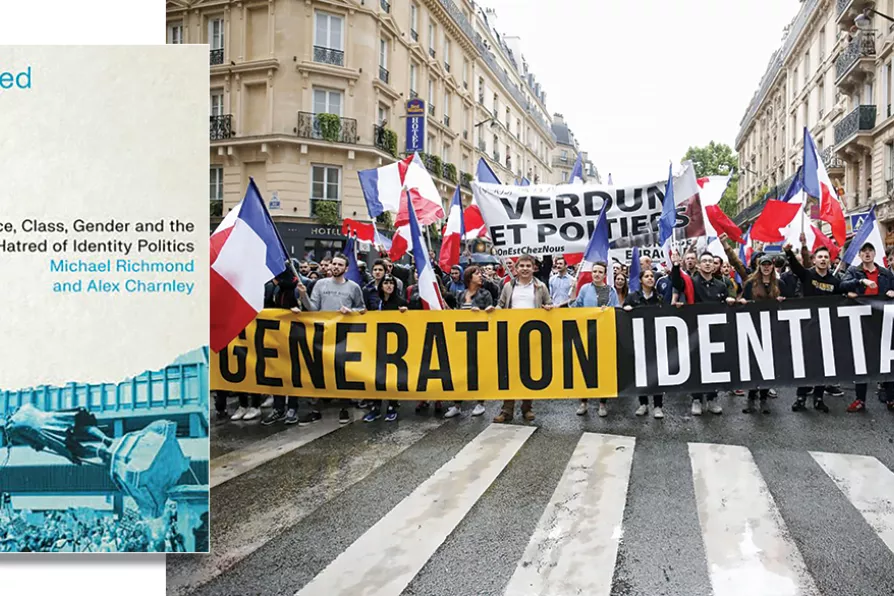SIMON PARSONS applauds an original, visual and movement-based take on the birth and death of a relationship

 EUROCENTRISM: The far right-wing Generation Identitaire (GI) seeks to promote a very specific All-European identity, against the values of the EU
[Pulek1/CC/2017]
EUROCENTRISM: The far right-wing Generation Identitaire (GI) seeks to promote a very specific All-European identity, against the values of the EU
[Pulek1/CC/2017]
Fractured: Race, Class, Gender and the Hatred of Identity Politics
by Michael Richmond and Alex Charnley
Pluto Press £16.99
HARDLY a day goes by without an issue raised by identity politics making headline news somewhere in the world.
Identity politics is the label attached to the process by which minority groups seek to remedy wrongs perpetuated against them. It denotes a wide range of political activity and direct action around shared experiences of injustice whose main goal is greater self-determination.
This sometimes forces the mainstream to be more respectful and act, but does this inevitably mean that participation in identity politics results in the formation of exclusive agendas as opposed to broad-based party politics?
Does it serve as a distraction from larger issues such as the massively corrupt and unequal economic and financial systems that benefit the top 5 per cent far more than the remaining 95 per cent?
It can be argued that capitalism actually desires and even encourages identity politics in order to create distractions that serve to deflect us from such issues.
In their book, Fractured, authors Michael Richmond and Alex Charnley, put such assumptions and stereotypes under the microscope, exploring the processes and assessing the historical quality of outcomes in a theoretical framework that encompasses terms such as reaction, upsurge, rupture, aftermath, and tracing how “universals” and “particulars” are contested.
Whole areas of activity are analysed in depth and key historical moments appraised, such as Black Feminism, White Feminism, the relations of patriarchy, emigration, welfare, agitation for restriction, lines of fracture, the artefacts of equality, civil rights, and gay and lesbian liberation.
Running through all of this is a refusal to accept the tropes offered by a dominant culture, often negative and based on an assumption of inferiority, but instead to reconstruct the sense of self and community in a positive light.
Solidarity can expand in defiance of pre-existing conditions and laws.
Toni Morrison argued that it takes extreme collective effort deliberately to forget how this world came to be and we should not rely on simplistic understandings of our complicated pasts.
The conclusion drawn by authors Charnley and Richmond is that the assumption of unity is, by and large, mythical. Therefore, disunity must be acknowledged and understood in order to be collectively addressed, and both struggle and coalition will be accelerated by this tactical understanding.
Identity, they argue, is expressive of both past and present class antagonisms, and regulated, maintained and enforced by state power. This leads to a reasoned analysis of how historical class struggles were formed, and, in an increasingly challenging and often dangerous world, such struggles still determine the outcomes of ever-evolving forms of solidarity.
The book ends with a quote from the Sri Lankan-British novelist Ambalavaner Sivanandan (1923-2018) who tirelessly sought to demonstrate the interconnection of race, class, capitalism and colonialism. The quote expresses his blueprint for grassroots organising. We should be “making an individual/local case into an issue, turning issues into causes and causes into movements, building in the process a new political culture, new communities of resistance that will take on power and capital and class.”
How then can we have a fair political system that helps those who face discrimination for not fitting into the mainstream definition of norms? How to have a society that truly reflects, in every conceivable way, all the people living in it? This seems more than ever, to be a long way off.
Identity politics are going to be around for generations, and this book leads us to a deeper understanding of where they have come from, how they work, how they could work, and the whole dynamic by which pressure groups encounter powerful elites.
There are no easy answers.

STEVE ANDREW enjoys an account of the many communities that flourished independently of and in resistance to the empires of old

ANDREW MURRAY recommends a volume of essays that nail the visionless, racist and neoliberal character of policy under Starmer’s Labour Party












